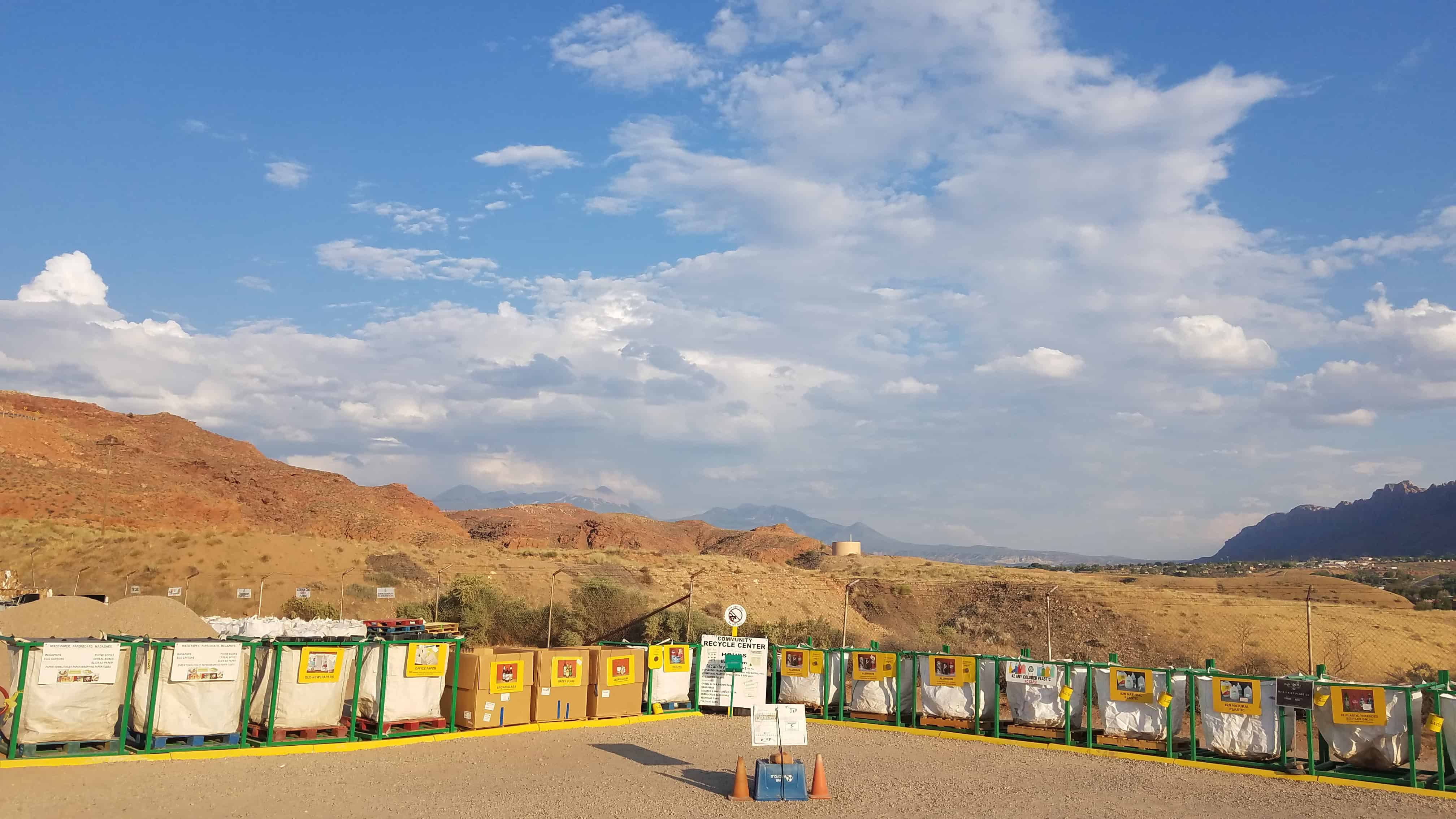Some information may be outdated.
On April 30, Grand County’s Solid Waste Special Service District #1 will acquire the real property and business operations of Monument Waste Services, which has provided trash collection services in Moab and Grand County since acquiring Bob’s Sanitation, the previous provider, in 2016. The SWSSD#1, Monument Waste, and advisors have been working out the details of the deal for months; at a March 22 meeting, the district board approved the $11.41 million purchase and a resolution authorizing the sale of up to $15 million in bonds to finance the deal. The two entities issued a press release on March 23 announcing the transfer.
No change in fees or services
SWSSD#1 Manager Evan Tyrrell said the acquisition will not change waste management services provided or fees charged to Grand County or Moab City residents.

Pictured: the drop-off location for the Community Recycle Center, 1000 E. Sand Flats Road [Photo: Solid Waste Special Services District #1]
“In the short term, we have no intention to change anything,” he said in a conversation with the Moab Sun News. “We intend to retain all programs, services and fee structures currently provided by both entities.” That includes single-stream curbside recycling services, sorted recycling drop-off at the Community Recycle Center, and all the services provided at each of the existing facilities. The district will also retain all current local employees at Monument Waste who wish to stay on.
“Everyone who currently works there will keep their jobs,” said Tyrrell. “We’re trying to do the best we can for them, keep their same rate of pay, the same rate of vacation accrual.” He added that the district will actually be able to offer improved health and retirement benefits to the transferred employees.
Financing
The Solid Waste Special Service District is an enterprise fund, meaning it covers its operational costs using the revenues it generates. For the district, those revenues come from bank account interest, disposal fees and the sale of recyclables. The county offers some support by allocating some transient room tax monies and mineral lease monies to the district. Recently, the district instituted a voluntary sponsorship program to support the Community Recycle Center, which has historically operated at a loss.
To pay for the real estate, buildings, trucks, equipment, containers and customer contracts owned by Monument Waste, the district has been working with Zions Public Finance to find an investor and negotiate a bond. Consultants analyzed in detail the finances and assets, revenues and expenditures of both the district and Monument Waste to determine the viability of the sale. Tyrrell said Zions finance professionals wanted assurance that revenues earned would equal 125% or more of the regular loan payback amount before considering it viable. Analysis shows that once the district is operating trash collection and collecting the associated fees, those revenues will meet the threshold of 125% more than the loan payments. The board approved a bond for more than the cost of the purchase to cover initial operation costs.
“We’re likely going to be borrowing a minimum of 12.5 million to allow us immediate cash flow to deal with immediate expenses,” Tyrrell said, noting that trash collection fees are paid monthly and the district will need to pay for operations during the first month before collecting those fees.
A public hearing will be held on the bond resolution on April 8. Tyrrell anticipates that the board will vote on approval of specific bond terms at that meeting. Information on that hearing can be found on the Utah Public Notice website, www.utah.gov/pmn/.
Streamlined operations
Tyrrell said the acquisition will be beneficial to the community.
“A centralized entity has a lot of benefits,” he said. “Sustainability, waste diversion, efficiency, optimizations, synergy.” A letter from the district board to the Moab City Council, dated March 29, lists in greater detail the potential positive outcomes from the acquisition.
“We strongly believe in the integrated solid waste management philosophies of reduce, reuse, and recycle,” the board wrote in the letter, noting that the district will be capable of prioritizing sustainability when in control of all local aspects of waste management. The letter also listed transparency and public involvement as advantages of the merger. The district board is composed of local elected officials and residents of Grand County who will have the community’s interest in mind when making decisions. Board meetings and district finances will also be available to the public. Tyrrell anticipates finding operation efficiencies that will make local waste management cheaper and more sustainable.
“This is a huge undertaking,” Tyrrell acknowledged. Tyrrell joined the district in 2019 and has implemented changes to streamline and improve operations at the district’s two landfills and at the Community Recycle Center.
“We have made lightyears of improvement at all three of our facilities and continue to make ongoing improvements,” he said, including building a strong staff and creating a desirable place to work.
“We’re fully capable of taking this on and making this a successful merger,” he said.
Appreciate the coverage? Help keep local news alive.
Chip in to support the Moab Sun News.




